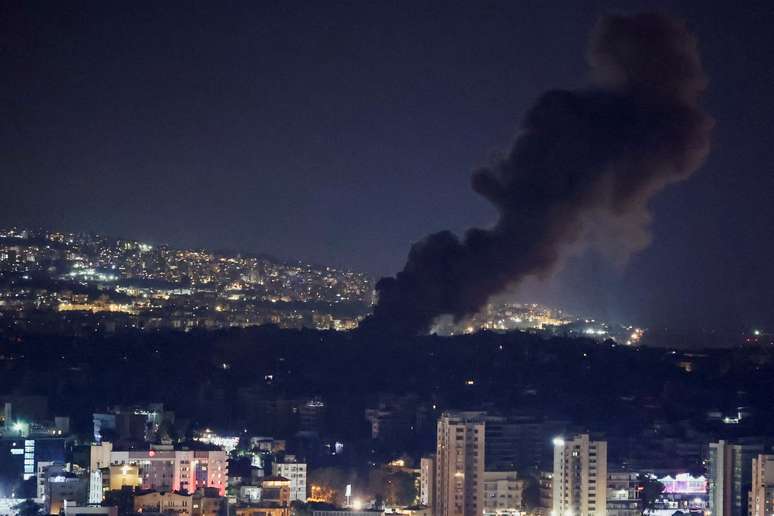Canceled flights and roadside bombs make it difficult for the Brazilian community to leave the country; Itamaraty maintains contacts with the Brazilians, but so far has not decided whether there will be a rescue mission
The lawyer Cláudia Chater, 60 years old, embarked on Beirut on the 17th of this month without imagining it thousands of pagers would go off in Lebanon a few hours later. Upon arrival in the Lebanese capital after two days of travel, the Israel’s war against the Shiite militia Hezbollah it had gotten worse. Cláudia had planned to return for Sunday the 29th, but the Israeli bombs got closer and closer to the airport and the flight was cancelled. “Now I don’t know how to get out of here,” he said Estadao this Monday, the 30th.
The daughter of Lebanese immigrants, Cláudia lives in Brasilia and went to Lebanon to see her family. He hadn’t seen them for seven years. He decided to settle the score with the ongoing war between Israel and Hezbollah because he believed the attacks were limited to the south, away from Aaoukar, a suburb near Beirut. The location of the US embassy in Lebanon was not actually attacked, but Cláudia realized that the bombs were closer than she thought. “My relatives’ house is at the top of the mountain. From here we see the smoke, we hear the bombs and the Israeli planes flying low, it’s scary,” he said.
Despite being in a place considered safe, the Brazilian says the feeling of fear grows as she feels trapped in the country. Israel continues bombing surrounding areas, including Beirut and locations near the airport. It was in one of these attacks that the country killed the leader of Hezbollah, Hassan Nasrallahon Friday. Most airlines have canceled flights to the country. Only one company, of Lebanese nationality, continues to operate.
Uncertain about her return, the Brazilian waited for Itamaraty’s guidance and looked for other ways to leave, such as crossing the Mediterranean Sea by boat to Greece, the closest European Union country. This Monday he entered the data into a consultation of the Brazilian embassy in Beirut to identify Brazilians interested in leaving the country. According to Itamaraty, the Brazilian community in Lebanon numbers around 20 thousand people.
Later Monday evening, President Luiz Inácio Lula da Silva ordered the government to promote a repatriation flight for Braziliansaccording to Brazilian diplomacy. “The operation, coordinated by Itamaraty and the Ministry of Defense, will be announced in the coming days, after analyzing the safety conditions of the flight,” Itamaraty said in a statement.
One condition for the repatriation mission not to be accelerated is the operation of Beirut airport, which remains open despite canceled daily flights. The embassy’s current orientation, until then, was that Brazilians who could leave the country should leave this way.
However, this is not a viable option in reality due to bombing and airspace uncertainty. “I don’t feel safe going to the airport and taking the risk of a new flight being canceled or leaving the country by land,” Cláudia said. “The feeling is that we can’t get out of this alone.”
Bombs and blackouts on the road
The risks denounced by Cláudia were experienced last week by thousands of civilians in Lebanon who were in bombed areas and were forced to leave their homes. Among them was another Brazilian daughter of Lebanese parents, 26-year-old Fátima Cheaitou. In Lebanon since July, he was at his parents’ house, near the city of Tyre, further south in the country.
On the 23rd, Fátima had to leave her home after receiving a warning from Israel that the area would be bombed. “When the alarm came, they were already shelling. We had 15 minutes to get out of our house. We heard that our neighbor’s house had been bombed. If we had taken a little longer to get out, we would have been trapped,” he explained. he said.
The Brazilian left the place with her parents. Other relatives living in the region also had to leave their homes. Everyone took the road towards Beirut or towards the north, where bombings are rarer. Along the way they saw fires caused by roadside bombs amid a blackout in the telephone network. They had no way to communicate with relatives as they drove on a road congested with thousands of cars.
The crossing was recorded by Fátima on social media, where she is an influencer. With 70 thousand followers on Instagram and 124 thousand on YouTube, the Brazilian-Lebanese, as she calls herself, has gained popularity by showcasing Muslim culture. His video went viral when it showed the long traffic jams and bombs in the surrounding area.
The Brazilian’s trip to Beirut lasted ten hours, eight more than normal. “It’s desperate to walk around listening to the sound of bombs and not knowing if your grandmother or your uncles are okay. You think you can’t do it anymore, that there’s a lot of pressure, but you have to keep going to live,” he said. In the Lebanese capital, she managed to fly to Paris, France, where she has been studying for a master’s degree in visual arts for two years, and left the country with her parents on the 26th.
The next day, Israel killed Shiite leader Nasrallah. In Paris, Fátima saw the news of the attacks in the region near Beirut and spoke to the journalist before confirming the death of Hezbollah’s top leader. “When I was in Beirut there was an attack. We were distressed because we thought it was a safe area. It wasn’t a total attack, but it was something scary. Even on Wednesday,” he said. “I’m worried about my grandparents and uncles, who are still in the countryside, about my friends, and I can’t tear myself away from the news. There’s no longer a safe place and they can’t go out.”
Destroyed houses and night of ghosts
Fátima Cheaitou was born and lived in São Paulo until the age of 18, when she moved to Lebanon. He lived in his parents’ house, near his relatives, in the Tire region, for six years, before going to Paris to earn his degree. I intended to return to the country at the end of the course, but the destruction of the war changed everything. “My city is destroyed,” he said.
“We know that in the region everything is destroyed and bombed. It’s very sad, you don’t know if your house will stay there. You don’t know if you can go back to that place,” he added. “I feel it in some very stupid things: my favorite restaurant has nothing left, it doesn’t exist anymore. There’s this feeling, of not knowing if we’ll go back.”
The last few days in the city were like a nightmare, he says. Citizens were awakened by the sound of bombs nearby. “You hear one after another, you feel it and it’s scary because it’s so close. And from my house you see smoke everywhere. The whole house shakes at those moments,” he said.
In unbombed regions, like Aaoukar, fear materializes in other ways. Cláudia Chater describes the place as a ghost at night, with restaurants and streets closed and people locked in their homes. “It’s very different from what I saw seven years ago, the last time I came to Lebanon. Here there was street life,” he said at the end of the interview. Hours later, at midnight in Lebanon, the Brazilian resumed contact to warn of new bombs in the region.
Source: Terra
Rose James is a Gossipify movie and series reviewer known for her in-depth analysis and unique perspective on the latest releases. With a background in film studies, she provides engaging and informative reviews, and keeps readers up to date with industry trends and emerging talents.


![Tomorrow belongs to us: What awaits you on October 14, 2025, Tuesday, October 14 [SPOILERS] Tomorrow belongs to us: What awaits you on October 14, 2025, Tuesday, October 14 [SPOILERS]](https://fr.web.img4.acsta.net/img/3a/6b/3a6b6c830f9faa61c326457b86fe9dcd.jpg)



